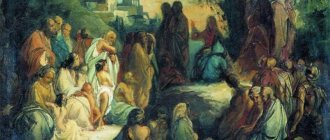The second commandment of God - do not make for yourself an idol: interpretation, brief explanation for adults and children
- You shall not make for yourself an idol or any likeness of anything that is in heaven above, or that is on the earth below, or that is in the water under the earth.
- There is not a single creation that can become for a believer the same power that the Lord is. When you climb a high mountain to meet the Lord, you don’t need to look at the reflection in the river flowing nearby. When presented before the ruler, there is no need to look around at his servants, hoping to hear advice from them or receive help.
- Do we turn to mediators in matters where only those closest to us can help? Will the Father remain indifferent to the experiences and difficulties of his children? With servants it is easier for those who have sin in their souls. But the sinless one does not turn his eyes away from his Father, but boldly looks at the one who is more merciful than the servants.
- The Lord burns away the sins in each of us, just as the sun’s rays have a destructive effect on harmful microbes that appear in water. This purifies the water and makes it suitable for drinking.
- Therefore, the second commandment is the prohibition of idolatry and the creation of idols for veneration. With the second commandment, the Lord prohibits the veneration of the likeness or image of what we observe in the sky (Sun, Moon, stars), and what lives on the earth’s surface (plants, animals, people) or is found in the depths of the sea (fish).
- However, this does not mean that the Lord forbids the veneration of holy icons and relics, because this is only an image, an image of the Lord, angels or saints. Holy images are given to us as a memory of the deeds of God and His saints, to lift our thoughts to God and His saints.
The second commandment of God - do not make for yourself an idol: interpretation, brief explanation for adults and children
Explanation of the second commandment for children:
- It is very difficult for a child to understand what an idol is or why people create idols. It is necessary to find a comparison that is closest and most understandable to the child.
- An idol is what a person mistakenly takes to be the most important and important thing in life. By worshiping idols or idols, a person may even forget about the Lord. But will a child exchange his mother for a doll or his father for a new bicycle? Let's remember the fairy tale about Kai and Gerda. The boy believed that the Snow Queen was his idol, forgetting about simple things - kindness, love. But this did not bring him happiness and the ice castle with perfect, regular cold pears became for him a cage in which his soul perished.
- And only Gerda’s love helped his heart melt and the boy remembered God. Likewise, any Christian should first of all love and remember the Lord, and only then - about loved ones.
“Let your Lord be the only God, Although there are always many different idols in life, Serve only Him with all your soul! Trust in God, not in people!”
Explaining the 10 Commandments to Children
How can we please our Heavenly Father? There is nothing incomprehensible or impossible about this - we just need to try to live according to God’s commandments, that is, to do what He teaches us and what He even requires, and not to do what offends Him.
The commandments are the law that God gave to people. When people fulfill this law, they live in harmony with the Creator and Savior of their souls. There are not so many commandments: the most ancient, the most important ones are ten. God Himself communicated them to the great saint of antiquity - the prophet Moses, and he passed them on to his people and wrote them down in the Holy Book - the Bible:
The first commandment - “I am the Lord your God, you shall have no other gods before Me” - simply says that you must always believe in God. It’s as simple and natural as trusting mom and dad, like trusting the sun that it will warm you and the water that it will wash you. Believe that God is always and everywhere, and this faith should be the most important thing in your life.
The second commandment - “Do not make yourself an idol” - says that you cannot be a traitor, like Judas. You must always be faithful to God and not listen to the devil: we know that he is a deceiver, an evil one, in the Bible he is called the “father of lies.” He quietly whispers his bad thoughts to us (“Don’t share candy with your sister, there are so few of them. You’ll eat it all yourself quickly, no one will know”). Often we don’t even know who is saying it, and we think that we came up with it ourselves. The devil invites us to do something that will upset our Heavenly Father, invites us to forget about Him. “Idol” is everything with which we forget about God. The one who is ready to exchange mom for a doll, and dad for a computer is crazy. Just as stupid is the one who, carried away by toys - children's or adults - forgets God. He thinks he has gained a lot - power, or wealth, or even all the happiness - but all he receives is a bag of trash. So Kai forgot about God - about Good and about Love - and believed the deceiver. And was he happy with all his ice toys and jewelry in the Snow Queen's castle? Only when Gerda’s love melted his frozen heart did he remember God and become a living person again. Therefore, we will always love God more than anything earthly, remember Him, remain faithful to Him - and then our whole life will be sanctified from above.
The third commandment - “Thou shalt not take the name of the Lord thy God in vain” - requires us to be attentive and serious in conversations with God and about God: we cannot do this with giggling, or with swearing, or simply in a hurry to get away quickly. You may have heard how stupid it can be when boys swear in the yard: “Here’s a true cross for you, I’ll break your big one!”, or: “By God, you’ll get it in my forehead!” Or they mock: “May God help you!” Or they ask God for something bad: “May God make this woman break her leg!” Or - what happens most often - they say all sorts of nasty, dirty words, sometimes even next to the name of the Lord or His Most Pure Mother. This is all very, very bad. This is the sin of blasphemy, and for this God always punishes people severely. However, this is not the only violation of the third commandment. If, for example, you pray with your parents in church or at home, and at the same time you think about anything but God (about toys, animals, pillows); if you are jabbering a prayer (you better finish reading it quickly!); if you cross yourself carelessly or behave badly in church, you violate God’s commandment. Remember, God is always there, He sees everything. Be afraid to offend Him with your negligence or stupidity!
The fourth commandment - “Remember the Sabbath day to keep it holy” - says that you need to live not only for yourself, but also for God. You understand that in a family everyone lives for each other: they love, care, and help. What kind of family is this in which the mother does not want to feed the child, and the father is too lazy to take him for a walk? Where does the child disobey his dad and bully his mom? These are not seven, but seven enemies! So, in order to be not at enmity with our Heavenly Father, but in love, we should remember God and keep the Sabbath day (a day dedicated to God) - live for God. And this means going to church, praying at home, helping the weak and poor, fulfilling all the commandments, no matter how hard, boring or lazy it is for us. This is our duty to Heavenly Father, and without this we will not have the right to be called His children.
The fifth commandment - “Honor your father and your mother” - reminds us that loving, obeying, helping dad and mom, grandparents, taking care of them when necessary is our responsibility before God. Remember how much trouble naughty children get into! Buratino didn’t listen to Papa Carlo - and barely survived! And that was because, although he was wooden, he was a kind boy: he loved and pitied Papa Carlo. But Cinderella loved her dad so much that for his sake she was ready to endure everything from her evil stepmother. And you remember how God rewarded her for her love, obedience and kindness. And we must also honor, respect and thank for the help and admonition of all our teachers, educators, priests and all the people who took care of us and taught us good - this is also required by the fifth commandment of the Law of God.
The sixth commandment is “Thou shalt not kill.” Of course, the worst thing is to deprive another person of the life that God gave him. But killing, torturing animals, birds, insects, and poorly caring for domestic animals is also a sin. And if you behave in such a way that another person is bitter, sad, hurt, offended, then you also violate the sixth commandment. Even in your thoughts you cannot wish harm to someone, think badly about someone, hate, get angry, scold: after all, all this kills love, and you know that the main thing that God teaches is to love people. Do you remember Pushkin’s fairy tale “About the Sleeping Princess and the Seven Knights?” How terrible is the beautiful queen who ordered her maid to kill the young princess! And how unsympathetic Cinderella’s evil stepmother is with her daughters! Evil people who have no love are disgusting to God and others. And if the villains do not repent and correct themselves, then God will not forgive them, He will punish them. You, my friend, try, according to God’s commandment, to love everyone, not to wish for anyone and not to cause harm - and then you will be a good person and a good Christian.
The seventh commandment is “Thou shalt not commit adultery.” Nowadays there are a lot of indecent pictures everywhere - both in magazines and on the streets; They show various nasty, depraved films on TV - don’t look at it, it’s all a sin against God. Never repeat bad words, don’t spy on adults and other children, don’t touch yourself in hidden places of your body: if you get carried away with this, you may develop a terrible disease of the soul and body - fornication, and you will have a lot because of it suffer. Be careful and remember that God sees everything.
The eighth commandment is “Thou shalt not steal.” Of course, you know very well that stealing is very bad. But do you know that not only taking someone else’s property is a sin, but taking something that’s simply not yours (found it and didn’t return it, misappropriated it) is also theft? But it happens that people steal in their thoughts: they are greedy, envious - isn’t this a sin? Such greedy people and thieves are disgusting to everyone, even to themselves! Their life is dark: they are always chasing something and cannot stop. They acquire wealth, but it slips through their fingers because it was obtained through dishonest means. They achieve influence over people - but even their friends leave them, because everyone despises thieves. Look, the cat Basilio and the fox Alice have been trying to cheat someone all their lives - but where is their wealth? So we were left with nothing in rags under the fence! Karabas and Duremar are important people, they had a lot of things and lost everything because they coveted other people’s property. But Pinocchio was neither a greedy nor a thief - he defeated all the villains and helped good people. And you, my friend, try to be as honest and kind as Pinocchio. Don’t be greedy and never steal - and God’s help will be with you in your good deeds. Just always remember that there is no such thing as petty theft, God will punish for anything: what is stolen, they say, is not good for future use, and especially if you stole it from a poor, weak person in a church, even your house can burn down. So watch out, watch out!
The ninth commandment is “Thou shalt not bear false witness against thy neighbor,” or simply put, “Thou shalt not deceive.” You are used to very often deceiving and lying about little things, and sometimes (especially out of fear) it happens that you tell a big lie. But know that lies are unbearable for God and are pleasing to the devil - it’s not for nothing that in the prayer “Our Father” the devil is called the evil one, that is, a deceiver. Try your best not to lie, not to be disingenuous, not to make excuses - and God will help you correct yourself, make amends for your wrongdoing or achieve your goal in an honest way. A lie always only seems like salvation, but in the end it will still be revealed (“There is nothing hidden that would not become obvious,” said Christ), so you will only be punished twice as much! One harm from a lie! One man shouted: “Fire, fire!” Everyone thought that there was really a fire, and they ran to this man to help put it out. And it turns out he was making jokes like that! He thought he was having fun, but people stopped believing him. When it really caught fire, no matter how much the man shouted “Fire!”, no one believed him, no one came, and so everything burned down. But Dunno: how he told three big lies in the Flower City, how he boasted to the little kids! And that he invented the balloon, and that he is the boss of all the little travelers! At first everyone respected him, but still the lie was soon revealed: how ashamed he was, how he cried! It’s good that the little ones were kind and forgave him, otherwise you might die of shame! That’s how bad it is to be a liar: shame, ruin, and punishment. So, my dear, never listen to the evil demon, do not deceive.
The tenth commandment is “Thou shalt not covet anything that is thy neighbor’s,” that is, “Thou shalt not envy.” This means - rejoice in what you have, and take all failures calmly, and for all the good things that happen to you, do not forget to thank God. Also learn to rejoice for your loved ones, friends, for all people, when you see that God has sent them something good. Even if you don’t have this, but you also want it, then don’t be jealous! God will also send it to you in due time. This will be a gift from God. Just don't be jealous! Envy always brings with it many sins and troubles. Those envious nasty, evil stepmothers of Cinderella and the Sleeping Princess - how much grief they brought to their loved ones, and ruined their own lives! And the matchmaker Babarikha with the Cook and the Weaver from “The Tale of Tsar Saltan”! They also did a lot of evil out of envy - they wanted to destroy the young queen and the baby prince, but they themselves barely survived! That's what envy does - drive it away from you, my friend!
The sixth commandment of God is not to kill: interpretation, brief explanation for adults and children
- The sixth commandment is the prohibition against killing by any means. The prohibition applies both to other people and to oneself (suicide). The most terrible and serious sin is the deprivation of life - the greatest gift of God.
- Suicide is one of the grave sins, in which not only the sin of murder is seen, but despair and daring rebellion against the Providence of the Lord. A suicide will not be able to repent after death and ask for salvation for his soul.
The sixth commandment of God is not to kill: interpretation, brief explanation for adults and children
Explanation of the sixth commandment for children:
- Taking the life of one person by another is the most terrible sin.
- The same sin is to torture animals, birds, insects. All of them are creations of the Lord, which man must take care of.
“It’s not just guns that kill people! And life is shortened. Sometimes it is not guns, but a rude word, a thoughtless act. Life destroys another, whether he is old or young. Take care of people, take care, love, bless everyone and give joy!”
The seventh commandment of God is not to commit adultery: interpretation, brief explanation for adults and children
- Adultery is a violation of marital fidelity. Illegal, impure love is considered sinful. Violation of marital fidelity and love is prohibited by the Lord.
- If a person is not bound by an oath of fidelity to his spouse, then he should adhere to pure thoughts and desires, remain virgin in deeds and words. What does this mean? It is necessary to avoid what gives rise to unclean feelings: swearing, shameless songs, dancing, looking at seductive images, shows, drunkenness.
Explaining the seventh commandment to children:
- A person bound by marriage or an oath of fidelity should not step over love or betray his loved one.
- A family can only be saved if both the man and the woman remain faithful to each other.
“Years will pass. You will grow up. God will give you a spouse. You will love it. You will get married. Always be faithful and devoted to your friend. Work on your relationships. Wait for God's answer. Don't change your love. Don't break your covenant."
The seventh commandment of God is not to commit adultery: interpretation, brief explanation for adults and children
The eighth commandment of God is not to steal: interpretation, brief explanation for adults and children
- Theft, as well as appropriation in any way of what belongs to another person, is prohibited by the Lord.
- Stealing is considered a bad act. If a person finds an expensive item on the street and takes it for himself, this is also considered theft. It would be better to try to find the person who lost this item. Such an act is a manifestation of loyalty to the holy God.
“The one who took their things from people in a dishonest way, that person became a thief, this will become known to everyone.”
The eighth commandment of God is not to steal: interpretation, brief explanation for adults and children
The ninth commandment of God is not to lie: interpretation, brief explanation for adults and children
- All lies, untruths, slander are prohibited by the Lord by the tenth commandment. Testifying to a lie during a trial against another person, denunciation, slander, and gossip are unacceptable for a Christian.
- You cannot lie even if you have no intention of harming your neighbor. Because such behavior is not consistent with love and respect for others.
Explaining the Ninth Commandment to Children:
- There are situations when the only way to avoid punishment may be to lie. But this method is just an illusion.
- By following the path of lies, you can overcome certain difficulties, but in the end, circumstances will develop in such a way that the deception will be revealed. You also can’t speak untruths about people.
“Don’t tell lies about people! For this, ask for God’s help, To see the good in your neighbors. Think not evil, but good about them! A lie can bring misfortune, but the truth can lead to your victory.”
The ninth commandment of God is not to lie: interpretation, brief explanation for adults and children
Lesson with presentation “Ten Commandments” lesson plan (grades 3, 4)
LESSON 2
Ten Commandments
Methodological development of lesson 2
Topic: "Ten Commandments"
Goal: to promote the familiarization of students with Christian values
Lesson objectives:
Educational:
- teach schoolchildren to read the Holy Scriptures and navigate its contents;
- to form in students an idea of the life of people in Old Testament times;
- to bring schoolchildren to the realization that the Ten Commandments are a spiritual Constitution, the basis of the common life of earthlings, a moral law, without which the world would plunge into chaos.
Educational:
- develop independent thinking, the ability to formulate thoughts and feelings, promote a conscious choice of a system of moral values;
- introduce children to reproductions of paintings by artists who used the theme of the Ten Commandments in their work;
- To acquaint students with sacred music and the works of Shakespeare.
Educational:
- to cultivate in students a respectful, caring attitude towards their parents;
- to cultivate love and respect for one’s neighbor, the ability to listen to the uniqueness of another person, to appreciate his individuality;
- think about the cause of people's suffering.
Equipment for the lesson:
- Bible. Ed. Moscow Patriarchate, 1956 (for each student);
- each student has a workbook on the subject. Felt pens, pencils;
- presentation on the topic of the lesson;
- music cassette “Ave Maria”, player;
- small cards for a quick survey.
Type of activity: discovery of new knowledge.
Leading technologies: game, work in groups, teacher's story, interactive group conversation, stories - monologues of students.
PROGRESS OF THE CLASS
“...thou shalt love the Lord thy God with all thy heart, and with all thy soul, and with all thy strength, and with all thy mind, and thy neighbor as thyself” (Luke 10:27).
Teacher: The topic of our lesson is indicated on the board. Let's start it with a game and call it: “We are the legislators.”
So you are sailing on an ocean liner. A storm begins. You and your family and friends find yourself marooned on a desert island. Day after day you look at the vast ocean in the hope that some ship will appear.
Finally, you begin to realize that you may be living here for many years. The understanding comes to you that laws are necessary by which you will live on this very island. Laws are rules that people must follow. They are in every country.
Teacher: what is the name of the set of laws by which Russians live?
That's right, the Constitution. And who can say on what the future of society, its strength, depends?
Student: “The head of the state should be an intelligent person.”
Teacher: “An intelligent person can be at the same time a tyrant (cruel).”
Student: “The state must have a well-trained army in order to be taken into account. The country must have a large gold reserve."
Teacher: We have a well-trained army, but sometimes they insult the honor and dignity of recruits. And gold reserves, as historical experience shows, can be stolen.
The future of any society - and our country too - depends on the moral character of the younger generation. Spiritual and political leaders will soon emerge from your midst. You will join the ranks of public figures, workers, and create your own families. As you are, so will be the society in which you live; such will be the army, and the president, and the welfare of the people.
So, we divide into three teams. Each team lives on its own island. Each team, after twenty minutes of reasoning and reflection, will have to formulate the basic principle, or motto, under which laws will be created on its island. The results of the discussions will be reported by the team captains.
_______________________________________________________________
Student: “The principle on our island will be “The greatest good for the greatest number of people.”
Teacher: which of your islanders knows what the highest good is for a person? The Apostle Paul, for example, once considered it good to “cruelly persecute the Church of God and devastate it” (Gal. 1:13,23). He says about himself: “I persecuted the followers of this teaching even to death, binding and delivering men and women into prison” (Acts 22:4).
When spiritual insight came to him, he realized that what he took for good was a terrible delusion, a mistake. The Apostle Paul deeply repented of what he had done and later wrote that he, who had once persecuted Christians, “now preaches the faith which he formerly destroyed” (Gal. 1:23). You see, even the Apostle Paul was wrong in defining what good is.
Student: And our group proclaimed the principle: “The majority decides everything.”
Teacher: As you put your principle into practice, you may encounter the following problems:
1. Does the minority have any rights?
2. What to do if the votes are evenly divided?
3. Vanya, what if the majority decides that you should be the one diving into the shark-infested ocean to get food? Laughter.
Student: and our motto is: “Do what you like, what gives you pleasure.”
Liveliness in the classroom.
Vanya: “I’ll probably move to your island.” Friendly laughter of children.
Teacher: have you ever thought about the fact that what gives pleasure today can turn into suffering tomorrow? A smoker enjoys the process of smoking, but the possible price to pay for this is lung cancer.
A state of intoxication that causes euphoria (high spirits) turns into a severe hangover (illness) the next day.
The use of drugs that create a short-term illusion of happiness leads to complete destruction of the body and early death.
Those who like to eat a lot and eat deliciously pay with the loss of slimness, obesity, and illness.
Student: “Well, then how can we live on these islands? According to what laws?
Teacher: To answer this question, I will tell you the story of Alexander Smith, who was forced to settle, like you, on one of the islands of the Pacific Ocean.
On April 28, 1798, a mutiny broke out on the British warship Bounty (Slide 1). The cause of the mutiny (uprising) was the cruel treatment of the sailors by the captain. The rebels, numbering 9 people, were landed on Pitcairn Island. (Slides 2-6).
8 people died from drinking homemade alcohol. Only one sailor survived, and that was Alexander Smith. Apart from him, the aborigines lived on the island - six men, ten women, and a fifteen-year-old girl.
Smith came across the Bible by chance and read it. I think Smith was deeply impressed by the words from the book of the prophet Isaiah: “I am the Lord your God, who teaches you good things, who leads you in the way you should go” (Isaiah 48:17). The former rebel took these words as an appeal from God to him personally and accepted God's guidance.
As a result, the moral and spiritual rebirth of this person began. In the evenings, he gathered the natives around him and read the Bible to them.
Smith decided to create a society with the aborigines that would live according to the laws set out in biblical teaching. Each community of people chooses a standard (model) in accordance with which it builds its moral and spiritual foundations.
20 years later, Pitcairn Island was accidentally discovered by two British warships. The crews of the ships found a Christian community on the island in the full sense of the word. (Slide 7).
There was no prison on Pitcairn because there was no crime; there was no hospital because there were no sick people there; there was no madhouse because there were no madmen there. There were no illiterate people there, and nowhere in the world was a person’s life and property as safe as there. The distinctive features of the island's population were peacefulness, high morality and piety.
Student: “What principle underlay the laws by which the population of this island lived”?
Teacher: Read the verse from the Gospel of Luke written on the board and answer this question yourself.
Disciple: These principles are “Love for God and neighbor.”
Teacher: yes. Love for God and neighbor is the basis of the Ten Commandments by which the population of the island lived.
Student: “What is a “Commandment”?
Teacher: The word “commandment” means “a rule that serves as a guide for someone or something.” The Ten Commandments are a moral law, a spiritual “constitution” for all humanity.
Student: “How did they appear?”
Teacher: In the last lesson, we learned that the Jews finally exodus from Egypt, where they had been in slavery for four hundred years. In the land of the pyramids they constantly saw gross idolatry. Not only did they see it, but sometimes they themselves took part in it.
God led them south, to Mount Sinai, to teach His people there, to prepare them for the highest level of religious life. He gave the Israelites the commandments, the religion, through which the nation of slaves became a spiritual light to the peoples of the ancient world. God gave the legislation of Sinai to the people through Moses.
Teacher: Lisa, who is Moses?
Student: “Moses is the leader of the Jewish people. He led the Israelites on dry land through the Red Sea to Mount Sinai."
Teacher: yes. The Ten Commandments were placed on two stone tablets. “The tablets were the work of God, and the writings written on the tablets were the writings of God” (Ex. 32:6) (Slides 8, 9). The God of the Old Testament appears as a terrible God and, in His holiness, inaccessible.
Disciple: “Mount Sinai was all smoking because the Lord had descended on it in fire; and smoke rose from it like smoke from a furnace, and the whole mountain shook greatly. And the sound of the trumpet became stronger and stronger. Moses spoke, and God answered him with a voice” (Ex. 19:18,19). (Slides 10, 11).
“And draw a line for the people on all sides, and say: beware of going up the mountain and touching its base; whoever touches the mountain will be put to death” (Ex. 19:12).
“And the Lord said to Moses: Go down and tell the people, so that they do not rush to the Lord to see Him, and so that many of them do not fall” (Ex. 19:21).
“All the people saw the thunder and the flames and the sound of the trumpet and the smoking mountain; and when the people saw it, they retreated and stood afar off” (Ex. 20:18).
Teacher: on slides 12-15 you see Mount Sinai in photographs. I made them on one of my trips especially for you, for our lesson.
The Gospel reveals a God who is already accessible and simple, but at what cost! He became a Man and through this gave Himself into the power of earthly malice and untruth. He gave Himself to be crucified.
The words that make up the Commandments are simple and publicly accessible, but filled with such deep meaning that they formed the basis of morality for all humanity. Let's take a look at them one by one.
Students take turns reading from the book of Exodus, chapter 20, verses 1–17.
- I am the Lord your God, who brought you out of the land of Egypt, out of the house of slavery. May you have no other Gods before Me.
- Do not make yourself an idol or any image. Do not worship them or serve them.
- Do not take the name of the Lord your God in vain; for the Lord will not leave without punishment the one who takes His name in vain.
- Remember the Sabbath day to keep it holy. Work six days and do all your work; And the seventh day is the Sabbath of the Lord your God.
- Honor your father and your mother, so that your days may be long in the land that the Lord your God is giving you.
- Dont kill.
- Don't commit adultery.
- Don't steal.
- Do not bear false witness against your neighbor.
10.You shall not covet your neighbor’s house; You shall not covet your neighbor’s wife, nor his male servant, nor his maidservant, nor his ox, nor his donkey, nor anything that is your neighbor’s.
Teacher: The first four commandments teach what a person’s attitude should be towards God.
The first commandment is: “I am the Lord your God.”
The Creator tells us: “It is I, I, and there is no God but Me: I kill and I give life, I smite and I heal; and no one will deliver out of my hand” (Deut. 32:39). We must understand and accept the all-encompassing invisible basis of life. Rejection of the invisible God is the result of spiritual ignorance.
The commandment warning against worshiping idols, I think, is also clear to you. The God of eternity cannot be limited to an image made of wood or stone.
The prophet Jeremiah talks about how idols are made - “gods” worshiped by the pagans: “They cut down a tree in the forest, shape it with the hands of a carpenter using an ax, cover it with silver and gold, attach it with nails and a hammer so that it does not wobble. They are like a sharpened pillar and do not speak; They wear them because they cannot walk. Do not be afraid of them, for they cannot cause harm, but they cannot do good either.” “Thus says the Lord: Do not learn the ways of the heathen” (Jer. 10:3-5, 2).
The commandment that calls us not to take the name of the Lord in vain means that we should not say the name of the Lord mechanically, superficially, without a sense of reverence and reverence. “Holy and awesome is His name!” exclaims King David (Ps. 111:9).
The observance of the Sabbath by ceasing all work on the seventh day was an ancient custom, but the custom was now confirmed by law. God established a day of rest in the history of Israel for the people.
The Day of Rest was intended not only so that a person could relax physically. It was a time to unite with God. Free time for unity with God. A person should not neglect the spiritual side of his life. In the first century of the Christian era, the celebration of Sunday, rather than Saturday, arose.
Respect for parents (the fifth commandment) has long been considered a moral duty of children. “The eye that mocks the father and neglects obedience to the mother will be pecked out by the ravens of the valley, and the eagle’s chicks will be devoured!” (Prov. 30:17). Moses instructs his people: “If anyone has a son who is violent and rebellious, who does not obey the voice of his father and the voice of his mother, and they discipline him, but he does not listen to them... Then let all the inhabitants of his city stone him to death; and so destroy evil from among you” (Deut. 21:18,21).
Children: “Wow, wow”!
Teacher: yes, these are formidable Old Testament warnings to children who neglect to obey their parents. The New Testament also calls for obedience and honor to father and mother: “Children, obey your parents in the Lord, for this is what justice requires” (Eph. 6:1).
In the father's house, father and mother teach their children obedience. Those who have not learned obedience at home will neglect discipline at school, at work, and in the state. He will start a family, but he will also treat his wife with disrespect. He will not honor God. Jesus Christ “was in obedience” to his earthly parents, and therefore later He was able to turn to God with the words: “Our Father who art in heaven, hallowed be thy name...”.
Teacher: What does “respect” for parents mean?
Student: “You have to be polite to them. Listen to them"
Teacher: that's right. But we must understand that respect is not cold politeness, but a cordial attitude. Parents need warmth. Share your joys and sorrows with them. The older your parents get, the more they will need you. It is in you, in your attention. It's so simple - touch a person, stroke him, ask how he is doing, how is his mood, tell him: “I love you.” Talk about a problem, ask for advice. These actions of yours will improve the physical and spiritual condition of your parents.
Parents are not chosen. They must be perceived as they are. The Lord said to Israel: “Cursed is he who curses his father or mother” (Deut. 27:16). It happens that a person has a conflict with his mother, offends her, and then laments: “Why do I have so many troubles and failures in my life?” And he does not understand that this is the result of the fact that he violated the spiritual law prohibiting slandering his mother. You also need to speak respectfully about your parents with strangers. Respect must be expressed in both words and deeds.
Joseph, being the governor of Egypt, not only took care of his father’s food during the famine, but when they met him, “bowed down to him with his face to the ground” (Gen. 48:12).
When King Solomon met his mother, he “stood before her, bowed to her, and sat down on his throne. They set up a throne for the king’s mother, and she sat at his right hand” (1 Kings 2:19).
Jesus Christ in the last painful moments of his earthly life, being on the cross, cared for the One who gave birth to Him: “At the cross of Jesus stood His Mother, and His Mother’s sister Mary of Cleopas, and Mary Magdalene. Jesus, seeing His Mother and the disciple standing there, whom He loved, said to His Mother: Woman! Behold, Your son. Then he says to the disciple: Behold, your Mother! And from that time on, this disciple took Her to himself” (John 19:25-27).
Only when you have your own children will you understand how much love your parents’ hearts are for you. Don't repay with ingratitude.
The English playwright William Shakespeare puts the following words into the mouth of his hero King Lear, rejected by his two daughters:
"Blow, winter wind, blow,
You are not as cruel as human ingratitude.
How much more painful than being bitten by a snake,
have an ungrateful child."
And a snake bite, as you know, can sometimes be fatal.
And do not forget about the existence of the spiritual “law of the harvest”: “What you sow is what you reap.”
Here's an example. The son takes his father, tears streaming down his cheeks, to a nursing home, while consoling him: “You will be better there.” The father replies: “I am not crying for myself, but for you. I took my father along this same road to a nursing home. The moment will come when your son will lead you along this same road.”
Teacher: Guys, have you encountered manifestations of ingratitude in your life? Tell me.
The sixth commandment is “Thou shalt not kill.” This commandment is aimed at protecting human life in society. To take the life of yourself or another is to try to take the place of God. A person can be killed not only with weapons, but also with slander, irritation, and anger. The cause of many accidents and fires that led to casualties was negligence and negligence. Let us remember that our negligence, slander, and unfair acts can turn us into murderers.
The commandment “thou shalt not commit adultery” (do not commit an act against love) proclaims the protection of the family and affirms the sanctity of the marriage bond. The Lord created man and woman. He prepared a beautiful home for them - the Garden of Eden. There was everything necessary for a human couple. Blessed them. The whole world was the temple of the Lord, and He Himself was the Priest.
The Lord established the rules of marriage, on the fulfillment of which the happiness of the spouses, the future of the children, and the well-being of each generation depend. A person who destroys a family destroys the future of society.
Marriage is taken under the protection of the Lord. In Israel, adultery (violation of fidelity to a spouse) was punishable by death. “Let the adulterer and the adulteress be put to death” (Lev. 20:10).
Adulterers were stoned to death. Marriage is a lifelong bond between one man and one woman. The only excuse for divorce can be the infidelity of one of the spouses.
"Don't steal"! Theft is theft, the theft of someone's property (private or public). The Lord says: “Do not steal, do not lie, and do not deceive one another” (Lev. 19:11).
“A false scale is an abomination to the Lord, but a right weight is acceptable to Him” (Prov. 11:1). Theft in the Sinai legislation is branded as a crime: “Whoever steals will be destroyed” (Zech. 5:3).
“He who acquires wealth by unrighteousness will leave it half his days, and remain a fool at the end of his days” (Jer. 17:11).
Theft is not only the robbery of a bank or collector, but also tax evasion, theft of an apple from someone else's orchard and simply free travel. The mark on the conscience remains the same.
“You shall not bear false witness against your neighbor.” The more perfect our spiritual life is, the less we judge others, and more ourselves.
The new law not only condemned the external evil deed, it penetrated deeper and condemned the evil thought itself, commanding “thou shalt not covet” anything that contradicts the basic laws of morality.
Student: “And if you don’t live according to the commandments, then what?”
Teacher: Read us verses from Deuteronomy, chapter 11, verses 26-28.
Disciple: “Behold, I offer you a blessing and a curse today:
It will be a blessing if you obey the commandments of the Lord your God, which I command you today,
And the curse is if you do not obey the commandments of the Lord your God and turn away from the way that I am commanding you today.”
Teacher: We will talk in detail about the consequences of fulfilling God’s commandments or rejecting them in the next lesson. At the end of the lesson, students make drawings in their notebooks on the topic covered. At this time, sacred music sounds muffled.
Homework - for those interested: on the small cards given to you, write a short, one or two sentence, answer to the question: “Why were we given the Ten Commandments?”
Examples of student responses:
Rodion: “A society without commandments is like a house without walls, like a pen without ink.”
Egor: “The first four commandments are for the spiritual world, and the rest are for the external world.”
Kostya: “The commandments are given so that a person understands the essence of life. They are given so that a person understands what love for God and neighbor is.”
Misha: “Without the commandments, chaos would reign in the world.”
Dusya: “If I got to a place where the commandments were fulfilled, it seems to me that I would be under strong protection and safe.”
Anfisa: “The commandments were given so that we would be kind and honest people. So that the world would be beautiful and kind.”
Veronica: “If the 10 commandments were followed everywhere, the world would be the most beautiful; it would be like being in heaven. Everyone would live a long time, and it would be so good that you can’t tell it in a fairy tale or describe it with a pen.”
Kolya: “Without the commandments the world would be terrible”!
Mansur: “If there were no commandments, all people would lose their belts.”
Dasha: “So that a person strives for the best.”
Thank you, friends, see you soon!
Page from
The tenth commandment of God is not to envy: interpretation, brief explanation for adults and children
- The Lord does not allow others to do something bad, and also forbids bad desires and thoughts towards others or loved ones. The tenth commandment speaks of the sin of envy.
- Anyone who mentally desires something else can easily cross the line separating bad thoughts and bad deeds. The very feeling of envy already defiles the soul.
- She becomes unclean before the Lord, because sin came into the world through devilish envy. A true Christian must cleanse his soul from internal impurities, guard against bad desires and remain grateful to God for what he has. If a friend or neighbor has a lot of everything, then you need to be happy for him.
Explaining the Tenth Commandment to Children:
- With the Tenth Commandment, God forbids people to envy. After all, this feeling prevents them from living joyfully: among loved ones and neighbors, among acquaintances, there will always be someone whose life may seem better than their own.
- But there are many examples in fairy tales that you cannot be greedy and always want more than you have. For example, the greedy old woman from Pushkin’s fairy tale “The Golden Fish”. If something very good happens to your friends, then it is better to be sincerely happy for them and thank the Lord for it.
“Do not covet anything that your neighbor owns. Don’t dream that someone has an extra item. These thoughts will bring you suffering, because you will bring punishment to yourself for sin.”
Spirituality lesson “The Ten Commandments are the basis of life”
Spirituality lesson in 4th grade “10 commandments - the basis of life”
Sharafutdinova Irina Vladimirovna primary school teacher of the Municipal Public Institution “Eryklinsk Basic School” of the Melekessky district of the Ulyanovsk region.
Lesson objectives:
1. Introduce children to the Ten Commandments of Jesus Christ.
2.Help you understand the value of the commandments of Jesus Christ.
3. Foster a sense of goodness, mercy, justice, honesty, fidelity, love; intolerance to cruelty, evil, theft, envy.
During the classes:
1.Organizational moment and goal setting.
Teacher's word.
-To live godly, we must know and love the word of God. Just as the body needs bread, so the soul needs the word of God; and just as the eyes need light to see, so the soul needs God’s teaching in order to grow in goodness and holiness.
(Patriarch of Moscow and All Rus' “Bible for Children”)
-What is piety?
?
-Piety - observance of rules, faith, combined with kindness and good behavior.
-Where can we learn to live correctly and behave correctly?
-There is a Law of God that is needed to ensure that the life of every person and everyone in general is safe, so that a person does not cause harm to other people, animals, birds, trees, the entire earth and the world around us. So that a person develops correctly, is healthy and happy throughout his life. And the Law of God is the 10 commandments.
-How and when did these commandments appear?
-Listen to the Sacred History of the Old Testament.
The student tells.
The Lord commanded the prophet Moses to lead his people out of Egyptian captivity. Moses led the Jewish people through the desert, and when they approached Mount Sinai, the Lord announced to the prophet: “Tell the people: if you obey My voice, you will be My people.” Moses conveyed the will of God to the people, and they answered: “We will do everything that the Lord has said and be obedient.” The Lord commanded to prepare for the acceptance of the Law of God by fasting and prayer. Three days later, a thick cloud covered the top of the mountain. Lightning flashed, thunder roared, smoke came from the mountain, and the whole of it shook. Moses went up the mountain, and there God gave him two tablets (stone tablets) on which the 10 commandments were written.
What are the commandments?
— Commandments are the law, the rules that God gave to people so that they could distinguish between good and evil in their actions and intentions.
2.
Introduction to the commandments of Jesus Christ (presentation)
1st
commandment: “I am the Lord your God, and there are no other gods besides Me.”
This means that God is One and you need to believe in Him with all your soul. This is as natural as trusting mom and dad. God created the whole world and takes care of each of us. You need to love and honor God, remember Him often, and turn to Him in prayer.
“Let only the Lord reign in your heart, And only to Him open the door of your heart! Let God be the meaning of your whole life! Let Him rule and rule in it!”
2nd
commandment
:
“You shall not make for yourself an idol or any image;
do not worship them or serve them.” An idol is everything that becomes the most important thing for us in life instead of God. Because of an idol, we can forget about God and His commandments. A fool is the one who is ready to exchange mom for a doll or dad for a computer. For example, Kai forgot about God - about goodness and love. The Snow Queen became an idol for him. Was he happy in the ice castle with his perfect, proper cold toys? Only when Gerda’s love melted the ice in his heart did he remember God and come to life. God should be in the first place in the life of a Christian, then all close people. Any idols - people or things - are dangerous for our soul; they can make it cold and callous.
“Let your Lord be the only God, Although there are always many different idols in life, Serve only Him with all your soul! Trust in God, not in people!”
3rd
Commandment
:
“Thou shalt not take the name of the Lord thy God in vain.”
This means that you cannot simply pronounce the name of God. The name of God should be pronounced with attention and reverence. Any appeal to God is prayer. As one priest aptly put it, when we say: “Lord,” we seem to pick up the telephone and dial a number, and at the “other end” they immediately answer us: “I’m listening.” The name of God must be kept carefully in the heart and not let go from there in vain. If out of habit you say in colloquial speech: “Lord,” add to this the words: “have mercy” or “glory to Thee.” In this way, mentioning the name of God will become a prayer.
“Don’t take God’s name in vain! Let your respect burn in those words. Let your heart beat with love for Him, Let gratitude and faith ring in it forever!”
4th
Commandment
: “
Six days you shall work and do all your work, but the seventh is a day of rest, which you shall dedicate to the Lord your God
.”
This means that the seventh day (Sunday) should be dedicated to God. Every day we pray to God, fulfill His commandments, but we especially dedicate Sunday to our Heavenly Father. Fulfilling the fourth commandment, on this day you need to visit the temple and take part in the divine service and Communion with Christ.
“With God, a Christian chooses life for himself, and therefore he always attends church. He strives very much to know more about the Lord, and to learn the wisdom of God from the Bible.” Dedicate time to the Lord - you will be successful, And tenderly comforted by His eternal mercy.”
5th
Commandment
:
“Honor your father and mother, that you may be blessed on earth and live long.”
This means that you need to listen to mom and dad and help them. Parents help you while you are growing and need their help and care, and then children help elderly and already infirm parents at the end of their lives. Honor is not just polite words, but real support of parents by adult children, including sincere attention and participation. The same commandment includes respect for teachers, mentors, and elders.
“Be respectful to your dad and mom! The wisdom and experience of parents are worth attention! Treasure them, listen and obey! Try to make your character like God! And then your life will be prosperous. It will be long, and, at the same time, not boring.”
6th
commandment
: “
Thou shalt not kill
.”
The most terrible thing a person can do to another person is to take his life. Life is a gift from God, and we have no right to deprive another person of this gift. As for killing invaders in war, this is also a sin, but less than betrayal of one’s neighbors, refusal to protect them.
We must remember that you can kill people not only with weapons, but also with words, deeds, and vile deeds. You should also not torture animals, birds, insects, or domestic animals. The Lord created them all, and commanded man to take care of them.
“It’s not just guns that kill people! And life is shortened. Sometimes it is not guns, but a rude word, a thoughtless act. Life destroys another, whether he is old or young. Take care of people, take care, love, bless everyone and give joy!”
7th
commandment
: “
Thou shalt not commit adultery
.”
That is, do not step over love. Do not betray. This is a commandment about being faithful to someone who loves you and is loved by you. Loyalty to this commandment is the key to preserving the family.
“Years will pass. You will grow up. God will give you a spouse. You will love it. You will get married. Always be faithful and devoted to your friend. Work on your relationships. Wait for God's answer. Don't change your love. Don't break your covenant."
8th
commandment:
“
Thou shalt not steal
.”
Stealing, taking someone else's property and not returning it is a very bad act. Some people think that taking something you found on the street is not theft. Let's say a man was walking and found a good phone on the street. He can take it for himself - do something bad, or he can do something noble - find the owner of this phone. Never take what belongs to others and never steal - this way you can show your loyalty to the holy God.
“The one who took their things from people in a dishonest way, that person became a thief, this will become known to everyone.”
9th
Commandment:
“
Thou shalt not bear false witness
.”
Sometimes it may seem to you that lying can help you overcome certain troubles and avoid punishment. But this is an illusion, because sooner or later any deception will definitely be revealed.
Also, under no circumstances should you invent things about people that you don’t know. Such assumptions are called slander and often defame a completely innocent person.
“Don’t tell lies about people! For this, ask for God’s help, To see the good in your neighbors. Think not evil, but good about them! A lie can bring misfortune, but the truth can lead to your victory.”
10th
Commandment:
“
Thou shalt not covet anything that belongs to others
.”
Never be jealous. Envy interferes with joy and knows no bounds, because there is always someone who seems to live better than you. Remember the example of the greedy old woman from Pushkin’s fairy tale. Rejoice at everything you have, rejoice for your loved ones and friends who have had something good happen, thank God for it. How do you feel about the fact that your neighbor has a good thing or a talent that you don’t have? Christians do not have the expression “white envy,” but they do have rejoicing—joy about the well-being of their neighbor. Unlike tormenting envy, this is a virtue.
“Do not covet anything that your neighbor owns. Don’t dream that someone has an extra item. These thoughts will bring you suffering, because you will bring punishment to yourself for sin.”
3.Work in groups.
Fill out the table
“ Commandments ” according to the example:
| commandment | what does the commandment warn against? | what a loving heart advises you to do |
| "Honor your father and your mother" | from disrespect for parents and elders in general | obey your parents, respect and take care of them; look after them in old age |
| "Thou shalt not kill" | ||
| before taking an item, ask permission from the owner; always return what is not yours; be content with what you have | ||
| from all untruth, deception, shifting one’s guilt onto another person |
4. Fastening.
Folk wisdom in proverbs.
-Connect the proverbs with the commandments with arrows.
Rust eats up iron, and the envious one dies from envy. (Honor your father and your mother).
Do not look for truth in others if it is not in you. (Do not lie)
Indulging a thief is like stealing yourself. (Dont kill)
You will find everything in the world except father and mother. (Don't steal)
Violence is poison for the soul. (Don't envy) (A friend is known in misfortune)
Reflection:
- Do you think we should act according to the commandments only towards those we love, or towards all people?
—What commandments did you know?
— What commandments did you learn about in this lesson?
11. Conclusion
: Every person must keep the commandments because:
-The commandments are given by God.
-They teach you to distinguish good from evil.
-Fulfilling the commandments gives a person peace of mind and brings him closer to God.
To put it briefly, the meaning of the commandments is one thing: that we respect and love each other. I think that after our lesson you will all want to think about whether each of you lives like this. I want you to want to re-read all the commandments and accept them into your mind and soul. Be happy and give happiness to your friends, loved ones and strangers.









